Contest - My Thoughts On The Global Recession | Understanding the Causes and Consequences of the Recession
Global Recession
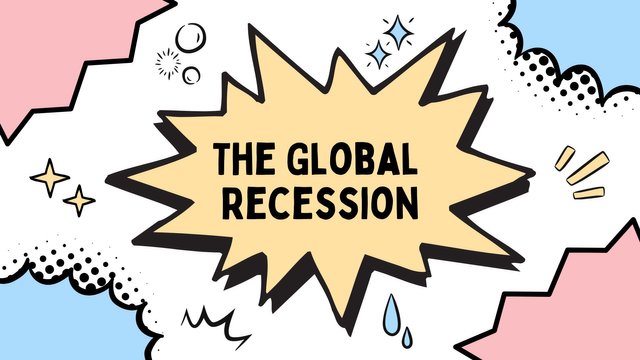
Image designed in Canva
A period of extensive economic deterioration that impacts numerous nations and regions worldwide is referred to as a global recession. This recession is exceptionally severe and protracted, and it could have a substantial effect on the world economy.
A large shock to the world economy, such as a financial crisis or a severe recession in a major economy like the United States or China, frequently causes worldwide recessions. Trade, investments, and employment are just a few of the sectors where a global recession can be felt. It can also cause a decline in worldwide economic activity.
The Great Depression in the 1930s, the energy crisis in the 1970s, the global financial crisis in 2008–2009, and the present recession brought on by the COVID-19 epidemic are a few examples of global recessions that have occurred recently.
Do you think we will face a global recession in the coming years? Based on what factors have you confirmed that there may be a global recession?

Image designed in Canva
It is important to remember that the world economy is intricate and influenced by many different things, such as geopolitical developments, market circumstances, and natural disasters. A recession may happen in the upcoming years for a number of reasons, including trade conflicts, natural disasters, or other economic shocks, even if it is difficult to anticipate the future direction of the global economy.
Despite this, governments and organizations from all over the world frequently seek to promote growth and stabilize the economy, and many have put policies into place to avert or lessen the consequences of a recession. Keeping up with economic trends and potential hazards is important, but it's also crucial to keep in mind that the economy is dynamic and subject to quick changes depending on a number of different circumstances.
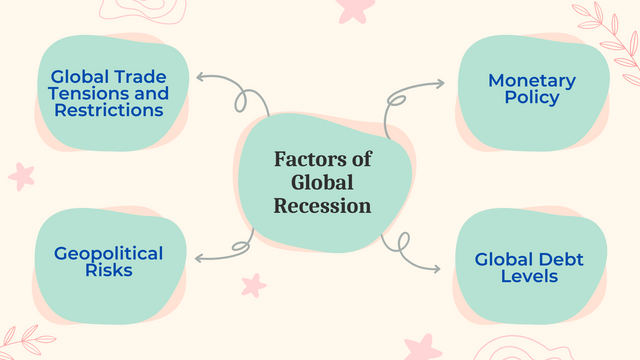
Image designed in Canva
A worldwide recession could be caused by a number of variables, some of which are as follows:
- Global trade tensions and restrictions: International trade can be a significant contributor to economic growth, but when nations implement tariffs or other trade restrictions, this can slow down trade overall and lower economic activity.
Monetary policy: The monetary policy that central banks use to manage a nation's economy, such as setting interest rates, is important. Modifications in monetary policy may have repercussions on international markets.
Geopolitical risks: Economic uncertainty can result from supply chains, trade flows, and investment being disrupted by political instability, conflicts, and natural disasters.
Global debt levels: Economic stability may be threatened by high levels of debt, both public and private, particularly if there is a sharp change in investor mood.
Pandemics or other health crises: The global economy may be significantly impacted by the breakout of a highly contagious disease like COVID-19, which can disrupt supply networks, result in major job losses, and lower consumer demand.
It's important to remember that a number of circumstances, including a confluence of these, might cause a recession to start. Because that economic conditions are continually shifting and can be impacted by a wide range of factors, it is difficult to say with any degree of certainty when or if a recession will occur.
How do you think the global recession will affect the job market, and what skills and qualities will be most in demand in the future?
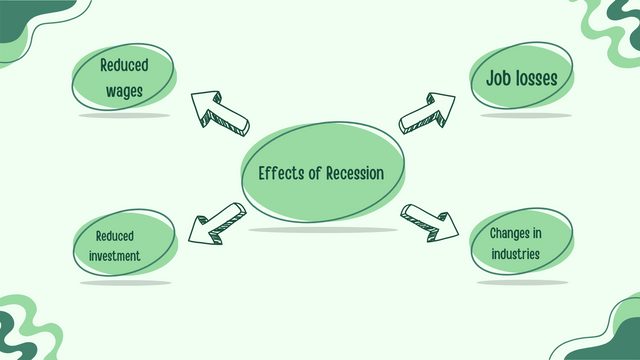.png)
Image designed in Canva
The job market can be significantly impacted by a global recession because as company activity slows, companies may make cost cuts and lay off employees. The job market may be impacted by a global recession in the following ways:
Job losses: Businesses that are having trouble making money during a recession may use cost-cutting measures including hiring freezes, furloughs, and layoffs. As a result, unemployment rates would increase and job searchers might have a harder time finding employment.
Reduced wages: Despite this, governments and organizations from all over the world frequently seek to promote growth and stabilize the economy, and many have put policies into place to avert or lessen the consequences of a recession. Keeping up with economic trends and potential hazards is important, but it's also crucial to keep in mind that the economy is dynamic and subject to quick changes depending on a number of different circumstances.
Changes in industries and job opportunities: Some industries may experience a recession worse than others, changing the job market. For instance, businesses in the hospitality and tourism sectors that depend significantly on discretionary spending may be particularly vulnerable. In contrast, sectors that deliver necessities like healthcare and technology can be more robust.
Increased competition for jobs: More job seekers on the market may result in greater competition for open positions, making it harder for job seekers to find employment.
Reduced investment in job training and development: Businesses may try to decrease costs during a recession by reducing investment in job training and development initiatives. As a result, it could be more challenging for employees to pick up new skills and grow in their careers.
In conclusion, the job market can be significantly and widely impacted by a global recession, and it may take some time for the economy and job market to recover. It's important to keep in mind, though, that the precise effects of a recession on the labor market might vary depending on the depth and length of the downturn as well as other aspects like governmental policies and assistance initiatives.
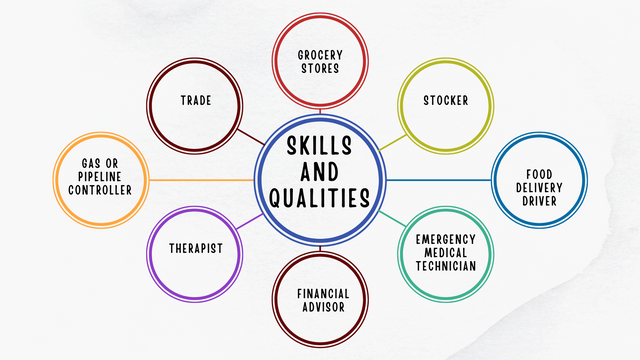.png)
Image designed in Canva
Given that the employment market might change depending on a number of variables, it is challenging to forecast the precise skills and characteristics that will be most in demand after a recession. On the other hand, based on previous recessions, there are several abilities and traits that have proven to be very useful in the post-recession employment market. These are a few instances:
- Flexibility and adaptability: Businesses may be reluctant to commit to long-term plans following a recession, which will raise the need for personnel who can be flexible and adaptable. Employees that can quickly change directions in response to changing circumstances, take on multiple jobs, and show a willingness to pick up new abilities might be especially useful.
- Digital literacy and tech skills: Data analysis, cloud computing, and software development skills are more in demand than ever thanks to the COVID-19 epidemic, which has hastened the transition toward remote work and digital transformation. Strong digital literacy abilities and the ability to use technology to boost productivity and efficiency will likely be in high demand in the post-recession labor market.
- Resilience and stress management: Recessions may be stressful and demanding for workers, and the capacity to manage stress and bounce back from setbacks can be particularly beneficial in the post-recession employment market. Employees who have developed resilience skills, such as mindfulness, self-care, and emotional control, can be more desirable to employers who are searching for workers who can negotiate unpredictability and hardship.
- Entrepreneurial skills: Following a downturn, some employees could decide to launch their own firms. For those looking to do so, entrepreneurship skills like marketing, sales, and financial management can be helpful. Employers seeking employees with an entrepreneurial spirit may find professionals with expertise starting and operating a firm to be particularly appealing.
- Collaboration and teamwork: As firms try to recover and rebuild after a recession, cooperation and teamwork can be especially crucial. In the job market following the recession, employees with excellent communication skills, the capacity to work well in teams, and the capacity to forge bonds with coworkers, clients, and partners may be in high demand.
It's crucial to emphasize once more that the precise abilities and characteristics that are most in demand following a recession can vary according on the sector, region, and other elements. Yet, workers can improve their employability and resiliency in the face of economic crises by concentrating on obtaining skills that are in high demand in general.
What lessons can be learned from past global recessions, and how can these be applied to better prepare for future economic downturn?
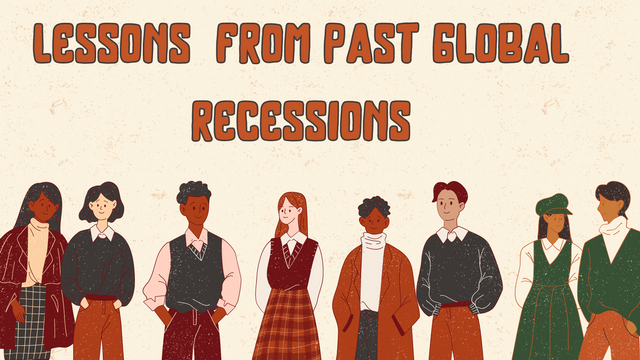
Image designed in Canva
A global recession is a period of significant economic decline that affects multiple countries and areas globally. This recession is particularly severe and long-lasting, and it may have a significant impact on the global economy. Past global recessions have taught us a number of important lessons.
Global recessions have demonstrated the complexity and interdependence of economic systems, demonstrating how the decisions made by one country or industry can have an impact on many others. This means that in order to lessen the effects of economic downturns, coordination and collaboration between nations and businesses are crucial. Fiscal and monetary policy are tools that governments and central banks can use to promote economic growth and assist in recession stabilization. This might entail actions like raising taxes, cutting spending, and lowering interest rates.
Risky and unethical activities in the financial sector contributed to or made previous recessions worse in several cases. These kinds of problems can be avoided, and the stability of the financial system can be ensured, by having strict financial regulation and control.
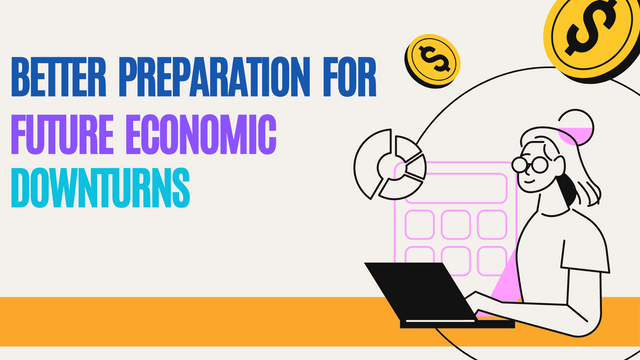
Image designed in Canva
Building up a financial cushion can help people and businesses survive economic downturns. This could entail diversifying investments to lower risk or setting up an emergency fund large enough to cover several months' worth of costs. Individuals can boost their earning potential and stay competitive in the work market by learning new skills and knowledge. Also, it can support firms' ability to remain creative and adjust to shifting market dynamics.
A more resilient economy can be created by tackling inequality, which can make the effects of economic downturns harsher. This could entail taking steps to lessen wealth and income gaps as well as regulations that guarantee access to necessities like healthcare and education.
Do you have any prior preparation? What are they?
Yes, I do believe that there has been some pre-preparation for the impending disaster situation over the entire nation. I'll show you some of my pre-preparation down below. Individuals and businesses can lessen the effects of economic downturns by getting ready for one.

Image designed in Canva
Both individuals and companies can accumulate an emergency fund to assist them get through a downturn. In times of financial difficulty, having a financial cushion can help cover expenses and act as a safety net. By lowering financial pressure and boosting financial flexibility, cutting debt and spending can help people and businesses survive a recession. Follow news and economic reports, consult with financial consultants, and keep up with current events to stay informed about the state of the economy. Make a contingency plan that details what to do in the event of a recession, including how to cut costs and decide what to spend money on first. It can be particularly crucial during a recession for people to continue to remain competitive in the labor market and to increase their earning potential.
These actions can help people and businesses get ready for a potential recession and lessen its effects. It's crucial to keep in mind that becoming ready for a recession is a continuous process that calls for frequent updating and improvement to guarantee that you are always prepared for any situation.
I am inviting my friends
@labonnoruva
@deepak94
@jyoti-thelight
To participate in this contest.
This concludes my post.
Hope you enjoy it.
See you in the next publication.
Regards
@mrsokal ✍️

Thank you for sharing posts, improve the quality of your posts and stay original.
Review |
You have presented the key points of the global recession very well. It is very important to sustain by assisting individuals and companies with finance.Thanks for sharing your experiences .Good Luck for the contest .